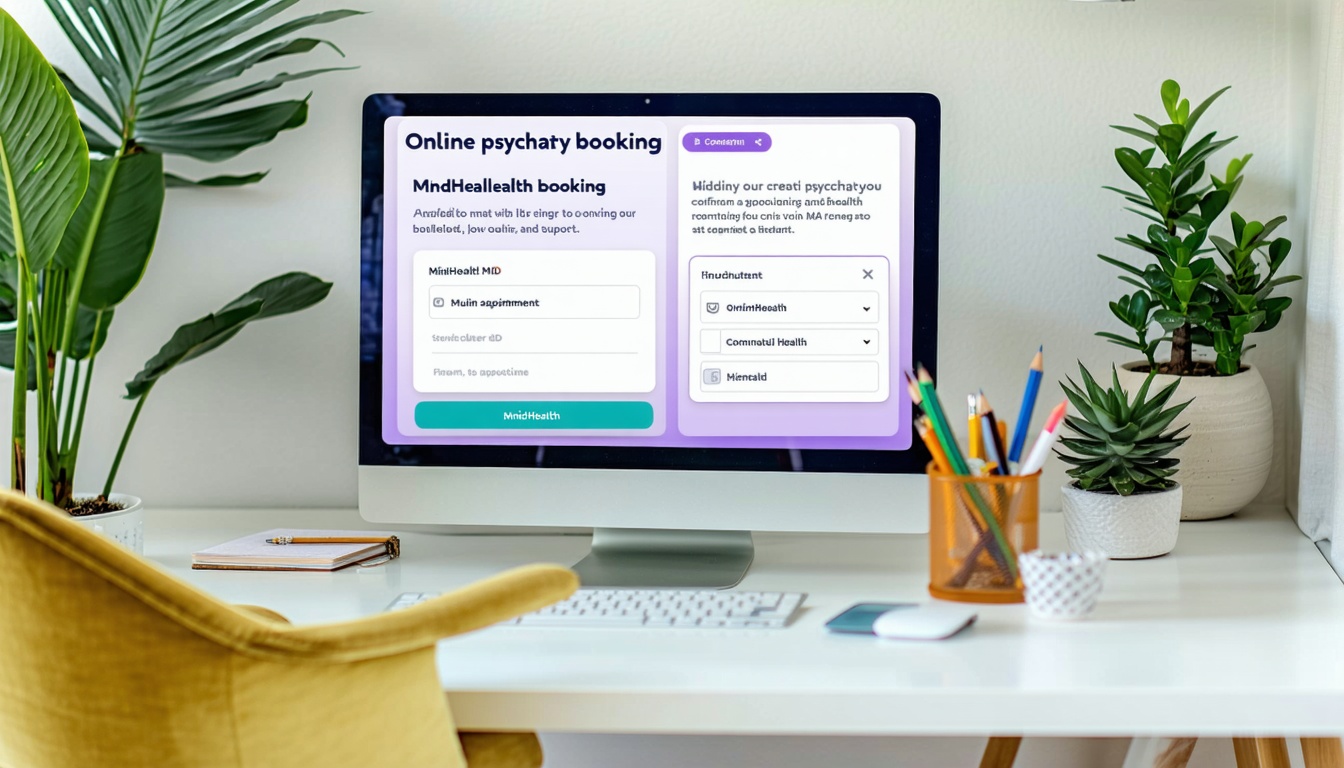If you or someone close to you has been wrestling with persistent anxiety, feeling hopeless, or just not finding joy in everyday life, it might be time to book a psychiatric appointment. Addressing your mental health needs early can set you on a path toward greater well-being, whether you’re looking into telehealth psychiatry, medication-assisted treatment (MAT), or TMS therapy. At MindHealth MD, we believe that everyone deserves convenient, high-quality care tailored to their unique situations and goals. In this post, we’ll walk you through when psychiatry can help, why telehealth meets modern lifestyles, how MAT and TMS services can offer new hope, and how to ensure your first appointment is productive. By the end, you’ll see why MindHealth MD stands out as a supportive place to start or continue your mental health journey.
Recognize mental health needs
Maintaining good mental health matters more than many people realize. In fact, more than 50% of people will receive a mental illness diagnosis or experience a mental health concern at some point in life [1]. Clearly, no one is alone in this struggle. Brass tacks: if you’re constantly overwhelmed, losing interest in things you once loved, or even resorting to harmful coping strategies, you’re far from the only one. The good news? There’s help available.
When to consult a professional
The idea of scheduling a psychiatry appointment can feel intimidating. Maybe you’re unsure whether what you feel merits professional help, or you’re worried about time. However, a few signs can point to the need for a closer look:
- You feel persistently sad, anxious, or irritable.
- You’re experiencing social withdrawal or isolating yourself from friends and family.
- Substance use feels like it’s spiraling out of control or overlapping with mental health symptoms.
- You’re having trouble sleeping, either too much or too little, which can be linked to anxiety or depression [1].
- You’ve noticed constant negative thoughts or an inability to see hope in everyday life.
If any of these situations hit home—or you can see them in a loved one—it might be time to book your psychiatric appointment. Early intervention makes a world of difference for countless conditions, from depression and anxiety to PTSD or substance use disorders.
Different mental health experts
There’s also confusion about who does what in mental health. Below is a quick comparison:
| Professional Type | Role & Services Provided | Prescription Authority |
|---|---|---|
| Psychiatrist | Medical doctor specializing in mental health, can diagnose, treat, provide therapy, and prescribe medications. | Yes, including complex medications |
| Psychologist | Provides talk therapy (psychotherapy), can diagnose conditions, focuses on behavioral interventions. | Typically no, except in limited locations |
| Psychiatric/Mental Health Nurse | Specializes in mental health care; depending on state laws, can diagnose, treat, and prescribe certain medications. | Varies by state |
| Licensed Counselor or Social Worker | Offers counseling, psychoeducation, and support for various mental or emotional issues. | No |
| Physician Assistant (PA) in Psychiatry | Treats mental health conditions under supervision, can offer counseling and prescribe medication in many states. | Yes (under supervision in most cases) |
If you haven’t met with a mental health provider before, you might start with a psychiatrist or a counselor, depending on the kind of support you’re looking for. Psychiatrists, for example, can handle complicated medication management if needed. Counselors and therapists focus on talk therapy and emotional support. At MindHealth MD, we help guide you to a provider who can match your needs, whether you need a psychiatric stabilization care plan, want therapy sessions, or require medications.
Consider telehealth psychiatry benefits
Telehealth psychiatry has carved out a critical niche in mental health care today. Why trek across town to an office if you can talk to a psychiatrist from your living room? For many, the biggest plus point here is flexibility—life is busy enough without adding commuting time to your schedule.
Who benefits most from telehealth?
- People with tight schedules: If you work full-time, have parenting responsibilities, or juggle multiple commitments, telehealth saves hours.
- Individuals in rural areas: If specialized care is scarce in your region, a telepsychiatry appointment brings that care right into your home.
- Mobility issues or health constraints: If leaving the house is a challenge, virtual visits remove obstacles and offer a safer path to professional help.
- Those seeking privacy: Some people feel less self-conscious logging into an online session rather than sitting in a public waiting room.
There’s also good evidence that telehealth psychiatry delivers comparable results to in-person sessions, especially for issues like depression and anxiety. Plus, MindHealth MD offers an online psychiatry booking system to make scheduling as simple as clicking a few buttons. If you want an evaluation quickly, we have flexible options like a same day psychiatric evaluation or a 48 hour psychiatry booking. We understand time matters when it comes to mental health, and nobody wants to wait weeks when they’re already in a tough spot.
Explore medication-assisted treatment
For countless individuals, addictions or dependencies on substances like alcohol or opioids can be deeply entwined with mental health concerns. An estimated 32.1% of US adults with mental health illnesses also experienced a substance use disorder in 2020 [1]. When these conditions overlap, it’s called a co-occurring issue, or dual diagnosis. This is where medication-assisted treatment (MAT) may shine.
How MAT works
Medication-assisted treatment combines carefully prescribed medication with counseling or therapy to address the psychological, social, and behavioral components of addiction. The idea is to stabilize your brain chemistry, manage or reduce cravings, and pave the way for sustainable recovery. At MindHealth MD, we offer medication assisted treatment in a clinical, compassionate setting so you feel safe and supported. Whether you’re exploring mat for opioid addiction or mat for alcohol dependency, the plan is tailored to your needs and closely monitored by our professionals.
Key reasons to consider MAT
- Reduction in cravings: Medications like buprenorphine or naltrexone are known to help dampen cravings, encouraging a more focused recovery journey.
- Lower relapse risk: By ongoing medication monitoring and therapy, MAT can reduce relapse and related complications.
- Integrated mental health care: If you have co-occurring anxiety, depression, or PTSD, your provider can adjust your medications and therapy accordingly.
- Flexible telehealth option: We also offer a telehealth mat consultation for those who can’t easily visit in person.
Successfully overcoming substance misuse relies heavily on ongoing support, so reaching out for help is often the first critical step. With dual diagnosis services such as our co occurring disorders treatment and dual diagnosis psychiatric program, you can ensure your mental well-being and substance use issues are treated simultaneously rather than in isolation.
Experience TMS therapy advantages
If you’ve tried different treatments for depression, anxiety, or other mental health conditions without seeing much improvement, TMS (Transcranial Magnetic Stimulation) might be an option. This noninvasive technique uses magnetic pulses aimed at specific areas of the brain to improve mood regulation. Electromagnetic coils stimulate neural activity in ways that can ease the severity of depression or other conditions that might not have responded to more traditional approaches.
What TMS does
Think of TMS like a gentle wake-up call for parts of the brain that may be underactive in conditions such as severe depression. These magnetic pulses help rewire neural pathways and chemical processes in a targeted manner. According to the Mayo Clinic, brain-stimulation treatments like TMS are especially beneficial when medications and therapy alone haven’t brought significant changes [2].
Why TMS might be right for you
- Noninvasive: TMS doesn’t require anesthesia, and you remain awake and alert throughout the procedure.
- Few side effects: Many people tolerate TMS well and experience fewer side effects compared to certain medications.
- Short sessions: A typical treatment session lasts around 20 to 40 minutes; you can then continue your day.
- Broad applicability: Used most often for depression, but research is ongoing for other mental health conditions.
MindHealth MD is proud to offer TMS with experienced transcranial magnetic stimulation providers. If you’re curious, you can even schedule tms treatment or look into our tms therapy for depression services as a fresh approach. We also work closely with your existing treatment plan, so if you’ve got a current prescription or ongoing therapy, TMS becomes an additional support tool, not a replacement.
Prepare for your first appointment
Booking a psychiatric appointment is a positive move. But you might be wondering, “What actually happens at that first visit?” Gathering relevant details beforehand makes it run more smoothly. You’ll spend the first meeting talking about your mental and emotional background, your personal and family history, your symptoms, and your goals for treatment. By sharing your experiences openly, you give your psychiatrist the best chance to pinpoint effective options.
How to get ready
- Collect necessary documents: If you have referral letters, blood test results, or scans, bring them along.
- Write down questions: Jot down any questions you have about treatments, side effects, or therapy to avoid forgetting them later.
- Track symptoms: A brief symptom log or mental health journal helps the psychiatrist see patterns in your mood or behavior [3].
- Be truthful: Open communication about your feelings, lifestyle, and concerns helps ensure you receive the best care possible.
- Plan your end goal: Are you seeking therapy, medication, or even advanced options like TMS or MAT? Sharing these objectives helps shape the right approach.
What to expect in session
Your first psychiatry appointment may take longer than future visits—possibly up to 1 to 1.5 hours [4]. During this time, you’ll discuss your background and current symptoms. Together, you’ll decide on a plan, which might involve therapy, medication, or specialized treatments.
A big part of MindHealth MD’s approach involves partnering with you in your care. It’s not just about prescribing a pill or scheduling therapy; it’s also about hearing your ideas and preferences. We find that building a mutual understanding right away helps you feel empowered and comfortable with your progress.
Why choose MindHealth MD?
So, why should you trust MindHealth MD for your telehealth psychiatry, MAT, and TMS services? We’re dedicated to delivering mental health care that is convenient, patient-centric, and innovative.
Comprehensive telehealth services
We know you’ve got responsibilities, whether it’s family, work, or personal errands, and that sometimes you need care right away. Our user-friendly virtual psychiatry session services put a professional right in front of you—no traffic jams or waiting rooms. It doesn’t matter if you’re a busy parent or constantly on the go for work: you can arrange an adult psychiatry intake appointment or even a child psychiatry immediate access session with minimal hassle.
Insurance and payment options
Worried about the cost? We offer in network psychiatry care and insurance accepted psychiatry so you can tap into policies you might already have. If insurance isn’t an option, a self pay psychiatry session is also available. The goal here is to reduce financial barriers so you can focus on getting better.
MAT for successful recovery
For individuals facing substance use issues, our substance use psychiatry service and combined approach with talk therapy and medications can make a significant difference. By harnessing MAT, you have a structured method to eliminate cravings and reduce relapse risks. Plus, if you’re navigating how to get started with medication-assisted treatment, we simplify it with resources like how to start mat program.
Advanced testing and diagnostics
The more detailed insight we get about your brain’s functioning, the more targeted your treatments can be. Our advanced eeg brain mapping test and eeg diagnostic for mental health use cutting-edge technology to tailor therapy and medication decisions. With eeg for treatment planning, you can see how certain interventions might affect you, and it gives our team a scientific basis for more refined strategies.
Leading TMS treatment
Our TMS department can work wonders for treatment-resistant depression. If you’re looking to combine medication, therapy, and TMS, or simply searching for in network tms providers, we’ve got you covered. By focusing on your comfort, we make TMS sessions calm, quick, and easy to fit into your schedule. Whether you’re exploring options for treatment resistant depression care or want more details on TMS, our staff is ready to answer all your questions.
Collaborative medication management
Sometimes mental health conditions respond best to a combination of talk therapy, lifestyle shifts, and medication. At MindHealth MD, our psychiatric medication management keeps you on track. We regularly review how you’re tolerating a prescription, whether you need adjustments, and how to balance it with other treatments like TMS or MAT.
Streamlined scheduling
Life shouldn’t have to stop just because you need professional care. Our scheduling system is fast and user-friendly, letting you line up consultations such as an immediate psychiatry appointment or a post discharge psychiatry care session for ongoing support. Every detail, from picking a preferred time to choosing between online or in-person sessions, is in your control. With MindHealth MD, you get:
- Online psychiatry booking with same-day and 48 hour psychiatry booking options
- Access to mental health urgent appointment slots if your symptoms flare unexpectedly
- Friendly staff who can walk you through technology setup for virtual sessions
FAQs about booking
You might still have questions about the process of setting up a psychiatry visit and how everything works. Below are five common questions and straightforward answers to help you feel confident.
-
What do I need to bring to my first psychiatric appointment?
You’ll want to bring any relevant medical documents, such as referral letters or lab results, and a list of current medications (including dosages). If you’ve recorded symptoms in a journal, that info can also be helpful. -
Will insurance cover my telehealth sessions?
Many insurance plans do cover telehealth mental health services, but specifics vary. We recommend contacting your provider or visiting our insurance accepted psychiatry page to confirm what’s included. -
Does medication-assisted treatment mean I’m on medication forever?
Not necessarily. MAT is best seen as a tool to manage substance use disorders and boost recovery. You might use these medications for a set period while working closely with specialists to taper off safely when the time is right. -
How do I know if TMS therapy fits my needs?
TMS is typically considered for treatment-resistant depression, but it can also help other conditions. If you’ve tried standard medications or therapy without success, TMS may be an option. At MindHealth MD, we do thorough assessments to make sure TMS aligns with your unique situation. -
Can I combine therapy with medication and TMS at the same time?
Yes. Many people benefit from a multi-pronged approach. For example, you might be prescribed medication to stabilize mood or reduce anxiety, engage in talk therapy to build coping skills, and explore TMS if you’re not responding as well as hoped. Your psychiatrist will work with you to find the right mix.
Take the next step
You deserve the chance to enjoy each day without being weighed down by anxiety, depression, or addiction. Whether you’re a busy parent who needs a virtual psychiatry session after dinner or you want to combine therapies to tackle a complex diagnosis, MindHealth MD is ready to support you. Our telehealth psychiatry and in-person services, along with cutting-edge options like MAT and TMS, make it easier than ever to get help. By taking the first small action—reaching out and scheduling an appointment—you can set your mental health on a new course.
When you’re ready, simply book your psychiatric appointment so we can talk through your symptoms, goals, and treatment preferences. If you’re uncertain about your next move, don’t worry. Our compassionate staff is here for you, eager to clarify any questions or concerns about processes, costs, or outcomes. You and your loved ones matter, and so does your mental health. Let MindHealth MD guide you to a healthier, more hopeful tomorrow.








